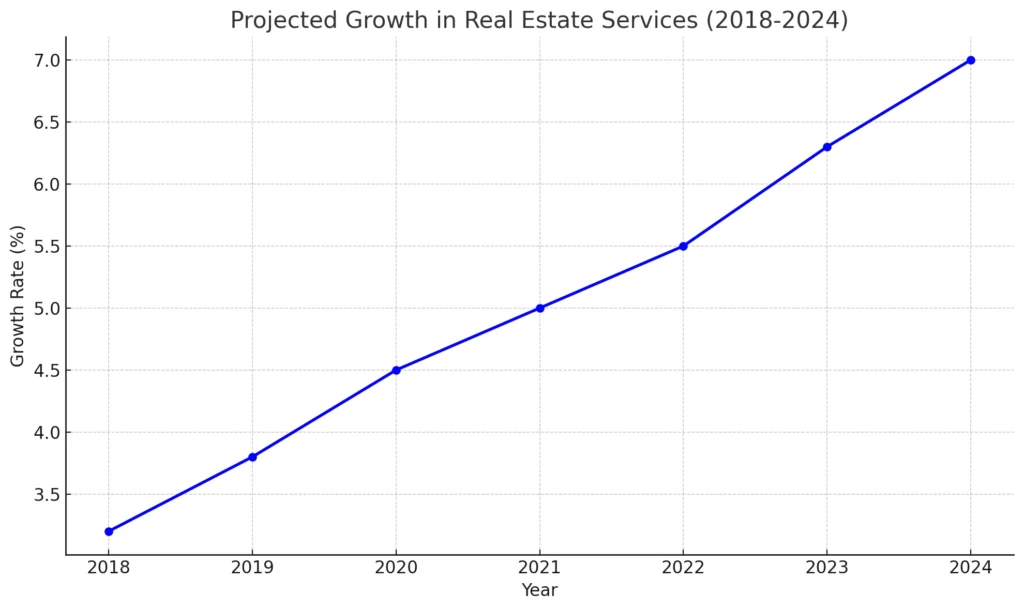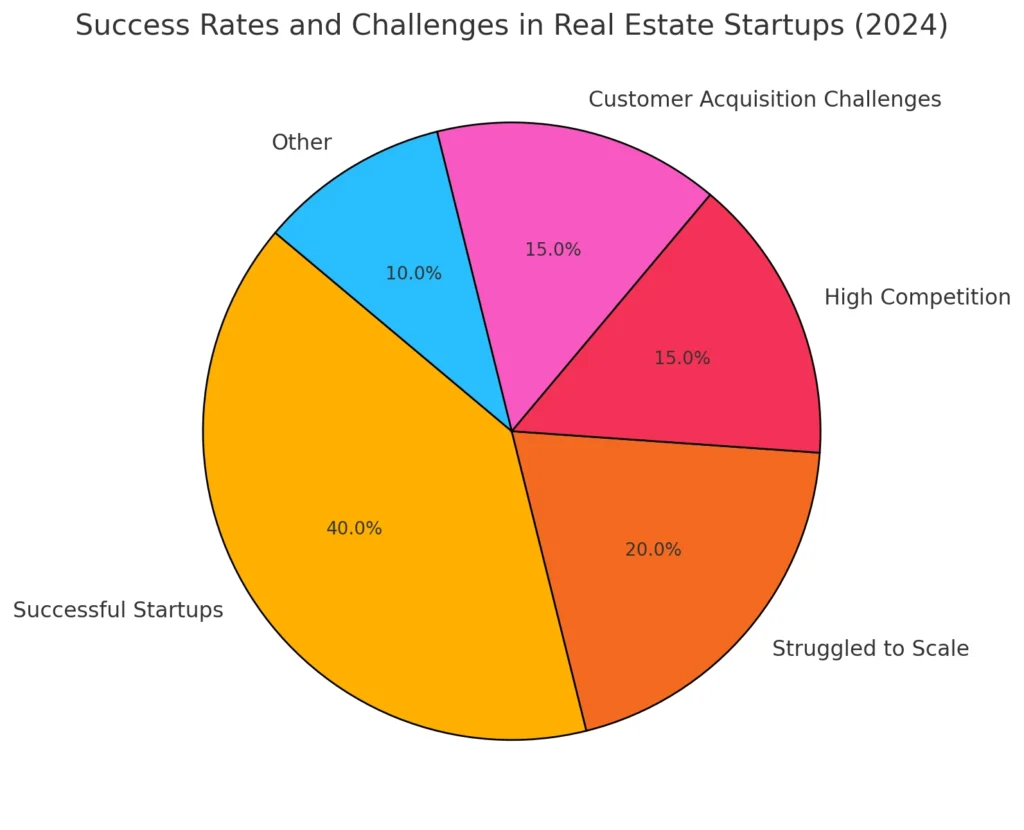In 2025, the real estate industry is witnessing transformative growth, fueled by evolving consumer demands, technological advancements, and increased focus on personalized services. For aspiring entrepreneurs, this dynamic landscape presents a prime opportunity to enter the market with innovative service-based startups that cater to niche needs and streamline real estate transactions. From virtual staging and property management solutions to environmentally friendly real estate services, the possibilities are endless for those looking to make their mark in this high-potential field.
Whether driven by digital transformation, sustainability, or a passion for helping clients find their ideal property, real estate service startups are uniquely positioned to capitalize on these trends. Each idea in this guide highlights a specific avenue within real estate services, providing essential details on startup requirements, target markets, and potential revenue streams. The goal is to inspire you to explore these concepts and discover a fitting business model that aligns with your expertise and ambitions.
Why Choose Real Estate Services?

Real estate services have become one of the most promising sectors for startups in 2025, combining the traditional allure of property with the forward momentum of digital transformation. As housing markets evolve, there is growing demand for innovative services that simplify real estate processes, cater to specialized needs, and elevate the client experience. This increasing interest from buyers, sellers, and investors alike is driving rapid growth in the real estate services industry, making it a perfect landscape for startups looking to carve out a niche and make a meaningful impact.
A key appeal lies in the industry’s versatility and scalability. Real estate service startups can range from virtual tour services that cater to remote buyers, to eco-friendly consulting services aimed at reducing a property’s environmental footprint. Whether targeting urban markets or suburban communities, each service can be tailored to meet the distinct needs of specific locations, demographics, and client expectations.
Furthermore, with the market value of real estate services growing globally, the potential for profitability is robust. As a result, startups have the chance to scale quickly by capitalizing on the momentum of property investment, tech integration, and shifting consumer priorities. In the following sections, we’ll explore top ideas within real estate services that are capturing market interest and proving valuable for modern consumers.
Read more : – What is Zillow App and How Does It Work?
Current Trends and Future Opportunities in Real Estate Services
The real estate industry is at a transformative crossroads in 2024, shaped by emerging trends and fueled by innovative technologies. As consumers seek faster, more personalized experiences, real estate service startups have the opportunity to meet these demands by embracing key industry shifts. Virtual tours, augmented reality, artificial intelligence, and eco-conscious practices are some of the most impactful trends driving change, each unlocking unique opportunities for businesses to stand out.
Virtual and augmented reality tools have gained significant traction, offering buyers the ability to explore properties remotely with immersive experiences. This trend is particularly beneficial for out-of-town buyers and international investors, who can assess properties in detail without visiting in person. Similarly, artificial intelligence has revolutionized data analysis, enabling real estate services to offer clients predictive insights on property values, investment potential, and even ideal buying or selling times.
Another area of growth is sustainable real estate services. With environmental awareness at an all-time high, services that assess and minimize a property’s carbon footprint, recommend green energy solutions, or guide eco-friendly renovations are on the rise. These sustainable services not only appeal to environmentally conscious buyers but also add value for property sellers.
In the years to come, the integration of these technologies will likely become standard, and startups that are early adopters have a clear advantage. Below is a comparative table of trending technologies within the industry and their potential impact.
With the rise of virtual tours, buyers can now explore properties remotely, saving time and simplifying the search process.
| Technology | Description | Impact on Real Estate Services |
|---|---|---|
| Virtual Reality (VR) | Enables remote property tours and immersive viewing experiences. | Enhances buyer convenience and expands reach to remote clients. |
| Augmented Reality (AR) | Provides overlay information on properties during virtual tours. | Adds value by highlighting property features and details. |
| Artificial Intelligence (AI) | Analyzes market data for predictive insights on property trends. | Supports data-driven decisions for clients and agents. |
| Eco-Friendly Solutions | Services focused on reducing environmental impact of properties. | Appeals to eco-conscious buyers and enhances property value. |
| Big Data Analytics | Uses large data sets to assess market trends and client preferences. | Helps tailor services to specific client needs and behaviors. |
Top 10 Innovative Ideas for Real Estate Service Startups
Diving into real estate services can be both profitable and fulfilling, with numerous opportunities to address specific needs within the market. Whether you’re looking to support buyers, sellers, or even fellow real estate agents, these top 10 innovative business ideas offer practical pathways to establish a standout startup in 2024.
| Business Idea | Target Market | Estimated Startup Cost | Profit Potential |
|---|---|---|---|
| Virtual Property Staging Service | Home sellers, real estate agents | $3,000 – $10,000 | High |
| Sustainable Property Consulting | Eco-conscious buyers/sellers | $2,000 – $8,000 | Moderate to High |
| Real Estate Drone Photography | Luxury property sellers | $1,500 – $6,000 | High |
| Virtual Reality Property Tours | Out-of-town buyers, agencies | $5,000 – $15,000 | High |
| Home Maintenance and Repair Services | Property owners/managers | $3,000 – $12,000 | Moderate to High |
| AI-Powered Property Valuation | Buyers, sellers, investors | $10,000 – $25,000 | High |
| Tenant Screening and Placement | Landlords, property managers | $1,000 – $5,000 | Moderate |
| Rental Property Management | Landlords, investors | $5,000 – $20,000 | High |
| Eco-Friendly Home Renovation | Eco-conscious homeowners | $7,000 – $20,000 | High |
| Property Investment Analysis | Real estate investors | $4,000 – $10,000 | High |
1. Virtual Property Staging Service
Showcase properties attractively through virtual staging, reducing the need for physical staging.
- Target Market: Home sellers, real estate agents
- Estimated Costs: $3,000 – $10,000 (initial software and marketing)
- Startup Requirements: High-quality photo editing software, design expertise
2. Sustainable Property Consulting
Help clients make eco-friendly home choices with energy-saving solutions and green materials.
- Target Market: Environmentally conscious buyers and sellers
- Estimated Costs: $2,000 – $8,000 (consulting materials, certifications)
- Startup Requirements: Sustainability expertise, partnerships with green suppliers
3. Real Estate Drone Photography and Videography
Provide high-quality aerial views to increase property engagement and showcase larger properties.
- Target Market: Luxury and large property sellers
- Estimated Costs: $1,500 – $6,000 (drone and equipment)
- Startup Requirements: Drone certification, photography skills, editing software
4. Virtual Reality Property Tours
Offer remote VR property viewings, allowing out-of-town buyers to explore properties virtually.
- Target Market: Out-of-town buyers, real estate agencies
- Estimated Costs: $5,000 – $15,000 (VR setup, software)
- Startup Requirements: VR software, 3D cameras, tech-savvy team
5. Home Maintenance and Repair Services
Provide maintenance and repairs to add value for property owners looking to sell or improve.
- Target Market: Property owners, property managers
- Estimated Costs: $3,000 – $12,000 (tooling, labor)
- Startup Requirements: Skilled contractors, licensed repair technicians
6. AI-Powered Property Valuation Service
Use AI to provide accurate, data-driven property valuations for buyers, sellers, and investors.
- Target Market: Buyers, sellers, and investors
- Estimated Costs: $10,000 – $25,000 (AI software, data subscriptions)
- Startup Requirements: Access to market data, AI software development
7. Tenant Screening and Placement Services
Help landlords quickly find reliable tenants through background checks and placement assistance.
- Target Market: Property managers, landlords
- Estimated Costs: $1,000 – $5,000 (software, marketing)
- Startup Requirements: Background check software, rental law knowledge
8. Rental Property Management
Support landlords by managing rental processes and providing on-site assistance as needed.
- Target Market: Landlords, property investors
- Estimated Costs: $5,000 – $20,000 (software, staffing)
- Startup Requirements: Property management software, team for on-site support
9. Eco-Friendly Home Renovation Service
Offer sustainable renovation services for homeowners seeking eco-friendly upgrades.
- Target Market: Eco-conscious homeowners
- Estimated Costs: $7,000 – $20,000 (materials, labor)
- Startup Requirements: Partnerships with eco-friendly suppliers, licensed renovators
10. Property Investment Analysis Consulting
Help investors make informed real estate decisions through data-driven analysis and consulting.
- Target Market: Real estate investors
- Estimated Costs: $4,000 – $10,000 (research tools, consulting resources)
- Startup Requirements: Market research expertise, investment knowledge
Real-World Examples

Real-world examples and case studies can offer invaluable insights for budding entrepreneurs, highlighting both the potential and challenges within real estate services. By analyzing successful startups and their approaches, we can better understand what contributes to growth and resilience in this field. In 2024, startups focusing on technology-driven and eco-friendly solutions have demonstrated impressive results, setting benchmarks for innovative approaches in the industry.
One such example is a virtual staging company that leveraged high-quality software to help property sellers transform vacant spaces into fully staged homes digitally. With a sharp increase in online home buying, this service rapidly gained popularity, drawing interest from both real estate agents and sellers. By avoiding the high costs of traditional staging, this startup achieved strong profitability, with a relatively low upfront investment in technology and design.
Another noteworthy case is a rental property management service that automated tasks such as tenant screening, rent collection, and maintenance requests. This business, by embracing technology, minimized operational costs and streamlined property management for landlords. Its efficient service model attracted small to medium property owners, allowing the company to expand steadily.
However, not all startups enjoy immediate success. Challenges, such as competition and scaling barriers, are often faced. For instance, a drone photography service saw rapid growth initially but soon encountered obstacles as more players entered the market. By diversifying into other offerings, such as 3D home tours, the startup managed to sustain growth despite a crowded market.
Startups focusing on sustainable real estate consulting have seen rising interest, particularly among environmentally-conscious buyers.
Mistakes to Avoid When Starting a Real Estate Services Business
Starting a real estate service business can be an exciting and rewarding venture, but like any industry, it comes with its own set of challenges. New startups often face pitfalls that can derail their progress, from misjudging the market to underestimating the power of customer relationships. Being aware of these common mistakes and learning from others’ experiences can be instrumental in building a sustainable and successful real estate service.
One of the most frequent mistakes is neglecting market research. Too many startups dive into services they believe are valuable without fully understanding their target market’s needs. Conducting thorough research helps identify the gaps and ensures that your service is designed to meet real, pressing demands rather than assumed ones.
Overestimating profit margins is another common misstep. Real estate services often have hidden costs—whether it’s licensing fees, technology upgrades, or unexpected advertising expenses. A detailed budget and realistic profit estimates can prevent financial surprises down the road.
Inadequate digital presence and marketing can also hinder growth. Many new businesses underestimate the role of a strong online presence and fail to establish effective digital marketing strategies. Social media, SEO, and a professional website are essential tools that attract clients and build credibility in today’s market.
Additionally, failing to focus on customer relationships can limit growth opportunities. In real estate services, reputation and referrals are powerful; treating each client interaction with care not only boosts client retention but also builds a positive brand image.
Read more : –Top 5 Mistakes Startups Make When Building a Blueground Clone
| Common Mistake | Description | Preventive Measures |
|---|---|---|
| Neglecting Market Research | Entering a market without understanding client needs. | Conduct thorough research to identify real market gaps. |
| Overestimating Profit Margins | Misjudging revenue versus hidden costs. | Develop a detailed budget with realistic profit estimates. |
| Inadequate Digital Presence | Failing to reach potential clients online. | Invest in SEO, social media, and a professional website. |
| Weak Customer Relationship Focus | Missing out on referrals and repeat business. | Prioritize client experience to build reputation. |
| Underestimating Operational Costs | Overlooking expenses like licensing and software updates. | Prepare a comprehensive expense projection and budget. |
Why Trust Miracuves Solutions for Your Next Project?
In a fast-paced and competitive real estate market, having the right support can make all the difference for your startup’s success. Miracuves Solutions stands out as a reliable partner with its expertise in developing cost-effective, ready-made app solutions tailored specifically for the real estate services industry. Our commitment to quality, speed, and affordability allows entrepreneurs to launch their business with a solid foundation, backed by technology and tools designed for impact.
Miracuves Solutions brings a wealth of experience in creating applications that streamline complex real estate tasks, from virtual property tours to client management systems. Our approach is centered on simplifying workflows, reducing operational costs, and enhancing client engagement—crucial elements for a successful startup. Additionally, with a track record of delivering solutions 90% faster than industry norms, we help clients gain a competitive edge and seize market opportunities quickly.
Choosing Miracuves Solutions means investing in a partner focused on your growth. We understand the unique needs of real estate services and provide reliable, ready-to-deploy solutions that adapt as your business scales. Whether you’re launching a property management platform or an AI-powered valuation service, Miracuves Solutions has the expertise to turn your vision into a profitable, high-functioning business.
Conclusion
The real estate services industry in 2025 offers a landscape rich with opportunity, adaptability, and innovation for aspiring entrepreneurs. Whether it’s virtual staging, eco-friendly consulting, or AI-powered valuations, each of the top 10 business ideas discussed provides a pathway to tap into current market demands. By staying aligned with emerging trends and leveraging technology, real estate startups can serve clients better, reduce costs, and create memorable customer experiences that drive repeat business.
Ready to turn your real estate vision into reality? Contact us today and let’s start building your success.
Starting a real estate service is not without its challenges, but with thorough preparation and smart strategies, success is within reach. With thoughtful planning, an eye for market needs, and perhaps a trusted partner like Miracuves Solutions, you can transform these ideas into a thriving business. Now is the time to take action, explore these ideas, and bring your real estate startup vision to life.
FAQs
What are the most profitable real estate service startups today?
Virtual staging, rental property management, and drone photography services are among the most profitable due to high demand and low overhead costs.
How much capital do I need to start a real estate service business?
You can launch a complete real estate service platform for just $2,000 to $5,000 using Miracuves’ ready-made solutions, fully configured and delivered within 3–6 days.
What skills are essential for running a real estate services business?
Important skills include market analysis, customer service, digital marketing, and, for some services, technical skills like photography or app management.
How can I market my real estate service startup effectively?
A strong digital presence is key. Focus on SEO, social media engagement, and professional branding to reach a wider audience and build credibility.
What are some common mistakes new real estate startups should avoid?
Avoiding market research, underestimating costs, and neglecting digital marketing can be costly errors. Planning ahead and focusing on customer needs are crucial to success
Related Articles:








